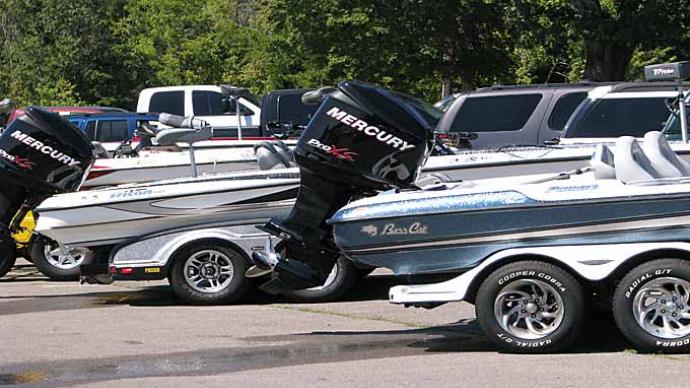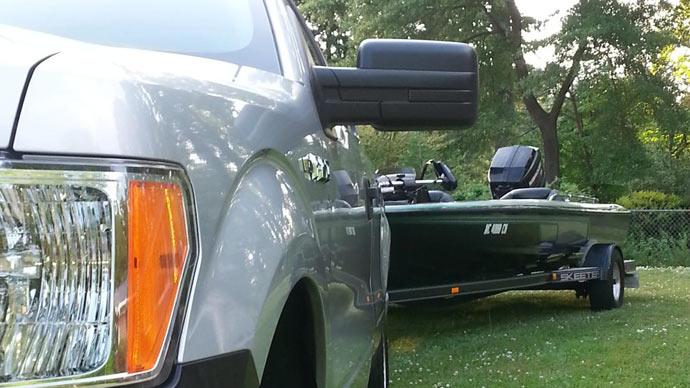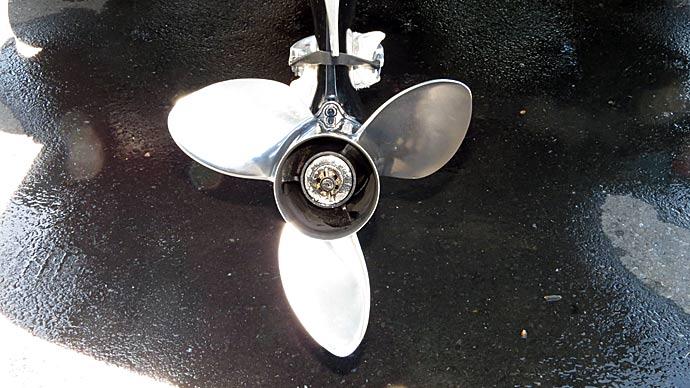Hey folks, Glenn May here with BassResource.com, and I'm gonna ask you a quick question. Have you ever had a buddy come off the water or seen someone come off the water, or maybe it's even happened to you, that said, "Man, you know, I don't know what happened. I was going down the lake and I just lost power. I got a spun hub, and I have no idea why. I didn't hit anything, never. I mean, it's been fine. All of a sudden, it just gave. I was getting it on plane and suddenly poof! I lost power." Well, if that's ever happened to you let's talk about that because there are ways to prevent that.
Before I get into that though I want to talk a little bit about the hub and what it does. Now, the hub, that's the core part of your prop. In this case, look at this, it's right here in the core, right in the middle. See, with the hub, the prop is actually not all one unit. Right inside, if you can see, there is a little rubber piece right in here with my fingers on right here, there's a rubber piece on there and there's another, you know, metal part in there, but the prop is actually separate from that. And the prop is pressed on to that and seated right to the rubber part really well, and it's not gonna give. I mean, it's really strong. But the reason it's there is because if your prop hits say a rock or something to that effect, that prop is gonna slip. It's gonna give. Why you want that to happen is because if it doesn't, then all the damage is gonna happen in your lower unit here. It's gonna be way more expensive than just having to repair a prop. So it's designed to save your engine.
Now, that's of course, under normal operating conditions. It's funny how the prop can actually give way and you haven't even hit anything. So there's really three main ways that can happen. So let me talk to you a little bit about those in no particular order. Now, I know I just explained the hub in a high level and all you guys that are really into... you know the gear heads that are really into props don't write me bad notes and letters because I didn't go into full detail of what that hub is, but in essence, that's what it does. And the rubber part, that's the key part to remember.
Okay. Let's go to reason number one why this can happen to you. First of all, it has to do with, unfortunately, your driving and how you handle the boat.
When you start from a dead stop, and a lot of us Bass anglers are guilty of this, myself included, especially if you're at a tournament, you're at idle or you're barely moving, and then what do you do to get up on plane? You punch it, right? Throttle the whole way down or hammer down on that foot peddle, and the bow goes up, and you get going, and you finally get up on plane. You start trimming up and you go. When you do that, basically, it's not geared at all to full down, you're putting a tremendous amount of torque on that hub, all right, tremendous amount. Now, it can withstand it. Don't get me wrong. But you're doing that over and over and over and over over the lifespan of a hub, it's going to deteriorate. It's gonna wear it down over time. You'll get it worn.
It can lead to, or be a cause, or part of a cause to a spun hub. I'm not gonna say it's the only reason you could do it. Some people do it all their life and never have a problem. But it can lead to...and I'll talk about some of the other reasons. When we start combining them, you increase your chances of this happening. But it does put too much pressure on. So what I do is I throttle about half way down, get the boat going, get it moving, and then just kind of gradually give it some more gas. That does two things. First of all, it's less pressure on the hub. But also, it's funny, you know, when you throttle and hammer down like that, that bow goes way up. Next thing you do and you're pushing a bunch of water in front of you, and it takes more effort and time to get up on plane. Well, if you do it slowly like I just told you, actually, what happens is you get on plane faster because the bow isn't up so much. There's not so much resistance and you get up on plane quicker.
Let's get on to the second reason. Again, it has to do with driving but it's also environmental conditions. If you're driving in, say, wind-driven waves, or a busy lake with a lot of wakes, or maybe, you know, wake borders out there, but anyway, a lot of turbulent water, and you're going too fast, you can go airborne. Especially, this happens in wind-driven waves. I'm guilty of doing this too. And what I mean by airborne is when you go airborne, you go completely out of water. So much so you hear the engine rev way up. When that happens the prop, suddenly goes way up in the stratosphere in rpms, just this free flowing. There's no water resistance. It gets going really fast then it lands on the water it goes, mhmm! It just crashed hits rally hard right in the water. Well, that's kind of like a soft pot strike, right? It's a lot of work. It's a lot of pressure, again, on that hub. What that's gonna do over time is it's gonna cause some damages. It's gonna wear it. And if you combine that with what I just told you, that is going to eventually lead to a spun prop, okay?
Driving that way is really rough on your equipment. If you find yourself going airborne like that, slow down. Trim down a little bit. Don't get that boat out of water. It's not a cool thing to do. It's going to damage your equipment. I know it can't always be avoided, those rogue ways come out of nowhere and suddenly you're airborne. If that happens and you find yourself airborne, you hear that engine rev up, the first thing you need to do is get off that throttle as fast as you can. Now, you're not gonna throttle all the way down, but you hopefully are gonna prevent or at least reduce the high rpms that the engine's gonna have when you go airborne. And because you're not on the throttle when you land in that water you're not gonna have as much torque and as much of a hit on that hub, like you would if you were still hammering down full power, okay? Just listen to that engine. If you get in that kind of situation, you hear that engine rev, pull off. It's got to be a knee jerk reaction. Hopefully that'll save some of the wear and tear on your hub.
All right. So let's get to issue number three, and this is a little more complex. But again, it goes back to that rubber component, that rubber sleeve that's part of the hub. Now if you look here in the back of your prop, right out of the hole, right here, this is the front part of it, this is where the exhaust comes out on most outboards like this. Exhaust comes out that way. Well, as you know, exhaust, it's hot, right? And normally as well, under normal operating conditions, with exhaust coming out, it's fine. The rubber that's in the hub is designed to handle all that heat. So it'll be fine for the lifetime of your prop.
However, if your engine's running hotter than it's supposed to, now it's a different story. Now you've gone to a different realm. That can be caused by three main things. There's other reasons but the three main things are, first of all, well, it's your water pump, your thermostat, or your poppet valve. We'll go into that briefly. The water pump, you need to replace the impeller every two years without fail. They wear out. They do. Your water pressure may look fine, guys, don't judge that as when you should do maintenance by the way. But if you feel...every two years that impeller needs to be replaced because it gets worn. Also, every year, even when you're not replacing that impeller, check the water pump anyway. Check that housing. It's made out of...depends on your engine, but it could be made of sort of a hard plastic.
Case in point, several years ago, during one of those inspections, we found that my housing was scorched. It was actually melted on the inside. And that was caused because...well, I talked to my mechanic. He said down here on the intake, I may have picked up a candy wrapper, plastic bag, could have picked up some leaves or something while I was running down the lake and all it takes is a short span for it to roam without any water, next thing you know, your housing is damaged. Now, I never do anything. I never knew a problem at all. The water pressure looks fine, but it's not running efficiently when that happens. And that means your engine's gonna run hotter than normal. Same thing with thermostat. Some engine's have one, some have two. The thermostat's not operating properly, your engine's gonna run hotter than normal. And also, there's a poppet valve in there. What that's designed to do is circulate water into different chambers in the engine when you're running at full speed to help keep it cool. It can get clogged with sand and other particles, and not operate correctly.
If any one of three of those things is wrong, your engine's gonna be operating hotter than it's supposed to, which means the gases coming, the exhaust coming out around that hub are hotter than they're supposed to. And when they're running too hot for what the rubber is designed to handle, you can begin to degrade the molecular structure of that rubber hub. You combine that with some of the issues I just told you, next thing you know, when you go to throttle down really hard again, when you're going to your next spot or when you're just driving down the lake, suddenly it gives, you're gonna be one of those guys at the dock going, "My hub spun. I have no idea why. I didn't even hit anything." Don't be that guy. Follow these tips, and your prop's gonna last you probably the life span of your engine.
For more tips and tricks, visit bassresource.com



